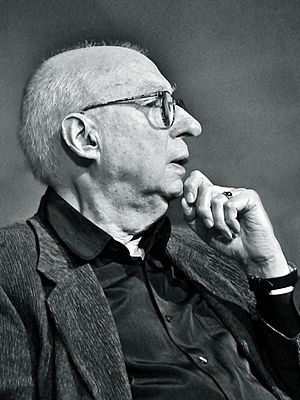Aribert Reimann facts for kids
Quick facts for kids
Aribert Reimann
|
|
|---|---|

Reimann in 2010
|
|
| Born | 4 March 1936 Berlin, Germany
|
| Died | 13 March 2024 (aged 88) |
| Education |
|
| Occupation |
|
| Organization |
|
| Awards |
|
Aribert Reimann (born 4 March 1936 – died 13 March 2024) was a German composer and pianist. He was especially famous for his operas, which are like big musical plays. Many of his operas were based on well-known books and plays.
One of his most famous operas is Lear. It was inspired by William Shakespeare's play King Lear. Another important opera was Medea, which first showed in 2010. Reimann also taught music at universities in Hamburg and Berlin. In 2011, he won the Ernst von Siemens Music Prize for all his amazing work in music.
Contents
Life and Music
Aribert Reimann was born in Berlin, Germany, on March 4, 1936. His father was a church musician, and his mother was a singer and voice teacher. So, music was a big part of his family!
When he was just 10 years old, he performed on stage. He studied music at the Musikhochschule Berlin. There, he learned about composing music and playing the piano. While he was still a student, he worked at the Städtische Oper, which is an opera house. He started performing as a pianist and accompanist (someone who plays music for a singer or another instrument) in 1957.
In the early 1970s, Reimann became a member of the Akademie der Künste in Berlin. This is a special group for artists. He also became a professor, teaching music at universities. From 1974 to 1983, he taught at the Musikhochschule Hamburg. Then, from 1983 to 1998, he taught at Berlin's Hochschule der Künste. He taught about "Lied," which are German art songs, often for a singer and piano.
Besides writing and teaching music, Reimann also helped create a series of CDs called Edition Zeitgenössisches Lied. This series featured modern songs.
Reimann became very well-known for his operas. These included Lear and Das Schloß. He also wrote other kinds of music, like chamber music (music for a small group of instruments), orchestral works (music for a large orchestra), and songs. He received many honors for his contributions to music, including the Grand Cross of Merit of the Federal Republic of Germany.
In 1997, he was a special guest at the Rheingau Musik Festival. He played the piano himself in some of his chamber music pieces.
In 2006, one of his new pieces, Cantus for Clarinet and Orchestra, was performed for the first time. He wrote this piece for a famous clarinet player named Jörg Widmann. Reimann said that the music was inspired by the works of another composer, Claude Debussy.
His opera Medea was first performed at the Vienna State Opera in 2010. It was based on a play by Franz Grillparzer.
Aribert Reimann passed away on March 13, 2024, when he was 88 years old.
Awards and Honors
Aribert Reimann received many awards for his musical talents. Here are some of them:
- 1962 Berlin Art Prize for Music (Young Generation)
- 1963 Villa Massimo scholarship
- 1985 Grand Cross of Merit of the Federal Republic of Germany
- 1987 Bach Prize of the Free and Hanseatic City of Hamburg
- 1991 Frankfurter Musikpreis
- 1993 Pour le Mérite for Arts and Sciences, Germany
- 1995 Knight Commander's Cross of the Order of Merit of the Federal Republic of Germany
- 1999 Commander of the Order of Cultural Merit of the Principality of Monaco
- 2006 Arnold Schönberg Prize
- 2011 Ernst von Siemens Music Prize
- 2018 Deutscher Theaterpreis Der Faust (a special award for his lifetime achievements)
Main Works
Aribert Reimann wrote many different kinds of music. Here are some of his most important works:
Operas (Stage Works)
- Ein Traumspiel (1965)
- Die Vogelscheuchen (1970)
- Melusine (1971)
- Lear (based on Shakespeare's King Lear) (1978)
- Die Gespenstersonate (based on The Ghost Sonata) (1984)
- Troades (based on The Trojan Women) (1986)
- Das Schloß (based on Kafka's Das Schloss) (1992)
- Bernarda Albas Haus (based on The House of Bernarda Alba)
- Medea (2010)
- L'Invisible (2017)
Orchestral Music
These are pieces written for a full orchestra:
- Variations for Orchestra
- Nahe Ferne (Near Distance)
- Cantus für Klarinette und Orchester (Cantus for Clarinet and Orchestra)
- Sieben Fragmente für Orchester in memoriam Robert Schumann (Seven Fragments for Orchestra, remembering Robert Schumann) (1988)
- Violin Concerto (1996)
Vocal Music
These are pieces written for singers, often with piano or other instruments:
- Zyklus nach Gedichten von Paul Celan für Bariton und Klavier (A group of songs based on poems by Paul Celan for a baritone singer and piano) (1956)
- Wolkenloses Christfest Requiem (1974)
- Nachtstück II für Baryton und Klavier (1978)
- Unrevealed, Lord Byron to Augusta Leigh für Bariton und Streichquartett (1981)
- Requiem für Sopran, Mezzosopran, Bariton, gemischten Chor und Orchester (A large piece for singers, choir, and orchestra) (1982)
- Shine and Dark für Bariton und Klavier (1989)
- Entsorgt für Bariton-Solo (1989)
- Eingedunkelt für Alt-Solo (1992)
- Fünf Lieder nach Gedichten von Paul Celan für Countertenor und Klavier (Five songs based on poems by Paul Celan for a countertenor singer and piano) (1994/2001)
- An Hermann für Tenor und Klavier (2008)
See also
 In Spanish: Aribert Reimann para niños
In Spanish: Aribert Reimann para niños

